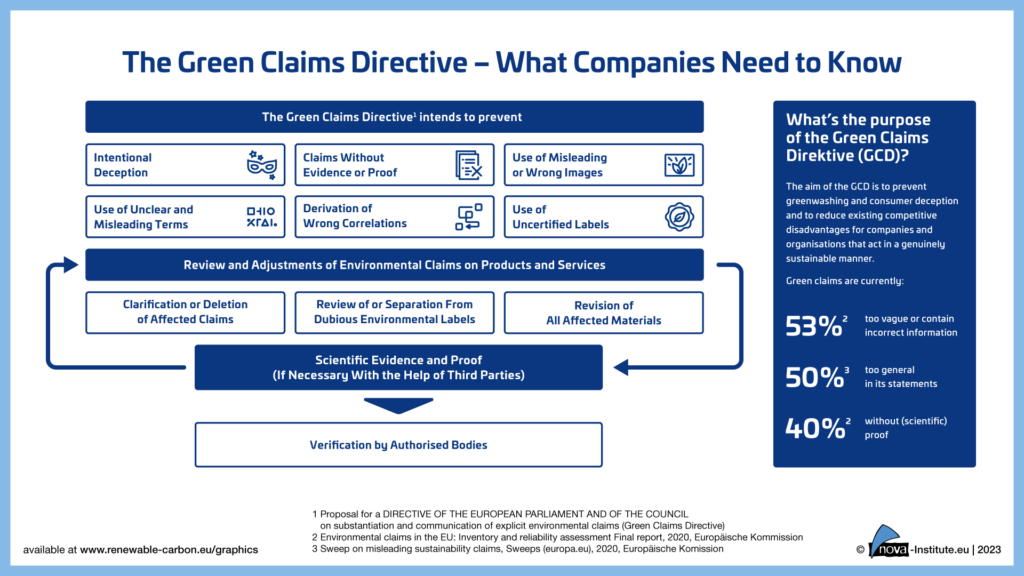In recent years, consumers have been increasingly bombarded by manufacturers and retailers with claims such as “carbon neutral”, “carbon negative” or “net zero”. As a result, these terms are losing credibility. And that with good reason, according to studies conducted by the European Commission in 2014 and 2020 . They found that around 53 per cent of all voluntary environmental claims made about products were based on vague or false information, while up to 40 per cent of all environmental claims examined contained no verifiable evidence at all. With the draft of the Green Claims Directive (GCD), the EU Commission aims to tackle this kind of greenwashing on consumer products.
What exactly is a green claim?
Under the Commission’s GCD proposal of March 2023, these are voluntary environmental claims “defined as a statement or representation which is not mandatory under Union or national law, including representations by means of text, images, graphic elements or symbols in any form, including labels, brand names, company names or product names, in the context of a commercial communication, which explicitly or implicitly states that a product or trader has a positive or no impact on the environment or is less harmful to the environment than other products or traders or that its impact has been improved over time, or that its impact has been improved over time. ” If this definition will be adopted by the EU and later incorporated into national legislation, it is to be expected that every voluntary environmental claim will be affected by the current GCD plans. Although the new directive will not be ratified until 2027, companies are well advised to address the issue of green claims at an early stage.
The EU Commission’s current plans for the Green Claims Directive
Even though the EU’s plans for the Green Claims Directive are intended to actively ban greenwashing and impose serious penalties, Michael Carus from the nova-Institute emphasises, “that the EU’s plans for the Green Claims Directive are indeed placing high demands on companies. However, companies that already have their environmental claims verified with reliable life cycle assessments should be on the safe side and be able to react quickly as soon as the certification rules are adopted”. However, the current state of play indicates that a significant number of companies will have to review their practices. Therefore, nova-Institute has analysed the potential impact of the planned Green Claims Directive and identified three relevant fields of action: The political framework for the intended market transparency, the methodological approach from an environmental perspective and the consequences for communication and marketing.
The political impact – consequences for all market actors to be expected
According to the Commission’s proposal, the Green Claims Directive would cover voluntary claims that state or imply a positive environmental impact and that are not regulated elsewhere. ‘Voluntary’3, because sustainability and ecological footprints of products can be advertised, but do not have to be. ‘Not regulated elsewhere’3 means that – for example – claims under the EU Ecolabel, the energy efficiency label or the organic farming label would not be impacted by the newly proposed Directive, since EU legislation already establishes more specific rules for those.
Further, the rules for substantiating claims include that a claim must be relevant to the product or company in question; that it must rely on recognized scientific evidence; that the environmental impacts subject to the claim are significant from a life-cycle perspective; and more. It also includes rules for communication, new labelling schemes and the requirements for certification bodies. Moreover, the new rules are binding both for European companies and those that produce outside the EU, but want to sell on the EU market. It is a core element of the legislation that it should create fair conditions for those companies that already act responsibly in terms of environmental product communication. For more specific information on the political framework, please see also the article “The proposed Green Claims Directive – Targeting Market Transparency for a Green Transition in Europe?”.
The sustainability perspective – how to get scientific evidence
While the proposal for the Green Claims Directive stipulates that voluntary environmental claims should be based on “generally recognised scientific evidence, use accurate information and take into account relevant international standards”3, and also the life cycle perspective is mentioned, the EU Commission remains rather vague when it comes to formulating a precise scientific methodology. But setting some kind of relevance threshold or any absolute judgement on whether an aspect is significant or not is not trivial.
Relevant international standards are, for example, ISO 14040 and 14044 for LCAs, or ISO 14067 for carbon footprints. They are already being carried out today, can be validated or certified via a review, and can thus quantify and substantiate statements on environmental impacts.
In addition to the life cycle perspective, another option for prioritising environmental impacts is described in the Product Environmental Footprint (PEF). Here, the individual results can be normalised and weighted according to a common standard. This is a possible starting point for categorising individual aspects as significant or insignificant. Nevertheless, there are still major differences in the assessment of individual products, e.g., the impact on climate change, which will also have an impact on the Green Claims Directive. Even if many aspects of the Green Claims proposal are still not defined in detail, it is already very clear that any type of offsetting must be specified as additional information and may no longer be deducted directly. This primarily addresses the increasing number of climate and carbon neutrality claims, which are largely the result of such offsetting mechanisms. For further information on the methodological approach, please read also the article “How to be green – What is a valid scientific proof for environmental claims?”
A new era of sustainability communications on the horizon
From a scientific perspective, the above steps are the right ones to prevent consumer deception. They will make the European market more transparent and sustainable, as the inflationary use of untrustworthy wording and labels needs to end. But from a communication perspective these obligations seem like a herculean task. Think of all the product leaflets and brochures, websites and newsletters – not to mention the annual and sustainability reports – that need to be checked and revised in detail.
At this point, companies find themselves at a crossroads: either they decide to do as little as possible in the hope of not being recognised and criticised, or they accept the challenge and see new rules as an opportunity. With the first option, companies can save time and money in the short run, but expose themselves to constant uncertainty. As member states would be able to impose fines, confiscate profits and exclude companies from public procurement for up to 12 months once the Green Claims Directive comes into force, the future damage could be even greater. However, if companies choose the latter option, they can begin to utilise the Green Claims Directive as a way to go far beyond communication. In fact, the requirements of the Green Claims Directive will help underpin all of a company’s environmental communication activities and give a competitive advantage to those that develop environmentally friendly products or services with scientific evidence. For more information on the consequences of the Green Claims Directive for communication and marketing, read more in the article “No Greenwashing, please!”.
To summarise, the EU’s planned Green Claims Directive poses an immense challenge for all industrial sectors. Although the European plans have not yet been finalised, it remains unclear how they will actually be implemented into national law. Nevertheless, companies should prepare themselves for possible changes in advance.
Please download the infographic on the Green Claims Directive here free of charge: www.renewable-carbon.eu/publications/product/the-green-claims-directive-what-companies-need-to-know-png/
Workshop provides first orientation: nova Session “Sustainability Claims under New EU Legislation”, 7 February 2024
How can companies prepare best for the Green Claims Directive? The upcoming nova Session “Sustainability Claims under New EU Legislation” on 7 February 2024 will provide a deep dive into the expected implications of the planned Green Claims Directive. Speaker of the nova session will be Lara Dammer, head of the economy and policy department, Matthias Stratmann, head of the sustainability department and Lucaino Proto Cassina, Specialist in Bioeconomy and Circular Economy Policy.
nova-Institute’s sustainability department has a wide range of expertise, including life cycle analyses (in accordance with ISO 14040/44, PEF-compliant), life cycle assessments, sustainability screenings and strategy consulting. The Policy & Economy department complements this with its knowledge of standardisation, certification and labelling as well as detailed analyses of the political framework.
For more information and registration, please click here.

For further questions on the effects of the planned Green Claims Directive, please contact Stefanie Fulda, Head of Communications, at the nova-Institute.
Email: stefanie.fulda@nova-institut.de
Phone: +49 1735125740
References:
[1] European Commission (2014) Consumer Market Study on Environmental Claims for Non-Food Products. Available at: https://commission.europa.eu/system/files/2018-05/green-claims-report_en.pdf.
[2] European Commission (2020) Environmental claims in the EU: Inventory and reliability assessment, Final report. Available at: https://circabc.europa.eu/ui/group/44278090-3fae-4515-bcc2-44fd57c1d0d1/library/b11ba10b-5049-4564-b47a-51a9bc9003c8/details?download=true.
[3] European Commission (2023): Proposal for a Directive of the European Parliament and of the Council on substantiation and communication of explicit environmental claims (Green Claims Directive). 2023/0085 (COD) Official Journal of the European Union (Ed.), 2023-03-22. Available at: https://eur-lex.europa.eu/legal-content/EN/TXT/PDF/?uri=CELEX:52023PC0166.
Source
nova-Institut GmbH press release, 2023-01-22
Supplier
European Commission
European Parliament
nova-Institut GmbH
Share
Renewable Carbon News – Daily Newsletter
Subscribe to our daily email newsletter – the world's leading newsletter on renewable materials and chemicals










